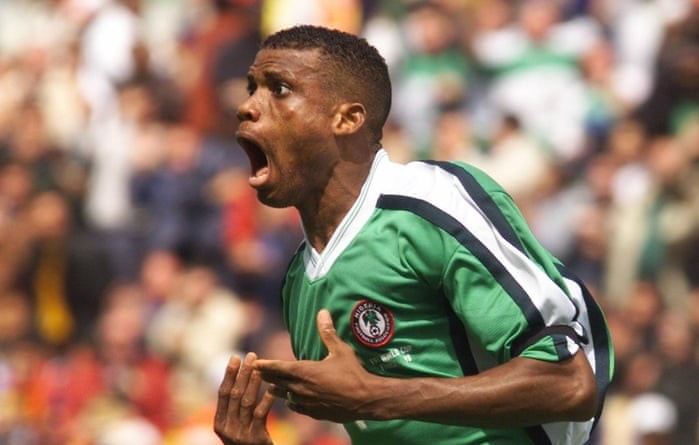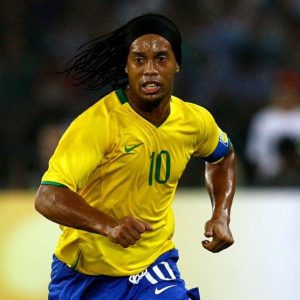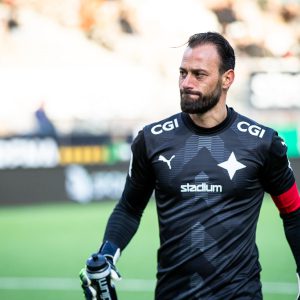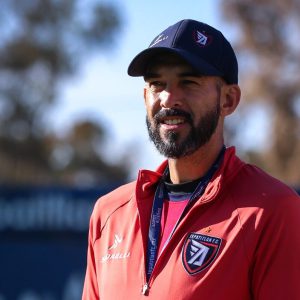

Sunday Oliseh: “Nigeria has the potential to be a World Champion”
Sunday Oliseh was a prominent element of Nigeria’s golden generation, which achieved notoriety in the 1990s after winning the Africa Cup of Nations in 1994 and the 1996 Summer Olympics gold medal in Atlanta.
Throughout his professional career, the former player has represented clubs such as Juventus, Borussia Dortmund, Ajax, FC Köln, and Genk. In this conversation conducted by Nuno Milheiro, Oliseh talks to us about his post-career steps, analyzes the potential of the current Nigeria national team, and his experience as a coach.
The former defensive midfielder has faced a fertile period of talented string-pulling midfielders during his shiny period on the Super Eagles and on the European historic teams where he played. “There was an older generation based a lot on individual play and then a new based on team play. I played when the transition was coming in. I learned in the early 90s that you have to think before you receive the ball. You have to know already what you are going to do without the ball. You can only change your mind if what you want to do is blocked. I have kept that secret to myself, but that is what everybody is doing now. If you think quick in football, you play better”.
Oliseh emphasizes the vital role that his generation had in accelerating the Nigerian football expansion on the international scene.
As a young person, you need a figure to look up to. Those figures are what push you to dream. No better figure can push you to do so than one from your kind and country because you can relate to their limitations. An African kid who wants to make it at Juventus cannot look at the way Zinedine Zidane or Alessandro Del Piero did it. You succeed in football when you take what somebody has already done and make it better”.
Today, he seems optimistic about the potential of the current Nigeria national team. “Nigeria has the potential to be a World Champion. An example has been set by our generation. The number one sport in Nigeria is soccer by far. Most kids on the street grow up playing it. What is pulling us down as a nation are administration and organization problems, but I am very optimistic”, he admitted.
For Oliseh, staying linked to soccer as a coach, analyst, and consultant after hanging up his boots has always been clear on his mind.
In 1998, when I was at Ajax, I decided that I was going to be a coach after football, applying my knowledge to this formula and sharing it with younger players. I also had the opportunity to be invited to television studios, especially BBC, because they liked the way I answered the interviews as a player and wanted to have me on the scene”, he said.
Coaching in a European context at Fortuna Sittard was, for him, highly challenging and an uninterrupted learning experience. “Coaching in Europe has been difficult in the sense that I had to work my way down from the ground. It was in 2005 when I started coaching kids in my son’s team. Then I coached the under-19 and adults. Firstly, I have followed a lot of coaches who succeeded and wanted to know why they were different. I also tried to learn a lot from playing styles, what makes them successful and what are the antidotes to each of them. Recently, I was able to orchestrate a second division team in the Netherlands, Fortuna Sittard, to the Eredivisie. We, colored people, do not get a lot of chances, but I felt at the same time you have to be ready when the chance comes because you cannot afford to fail. In coaching, the most important is when the game starts, and you are standing there. What you prepare is not what you meet when the game starts”, he concluded.
Get to know more about Soccer HUB!
Follow us on Facebook!
Categories
Latest Courses
-
9 Lessons
-
1 Lesson
-
6 Lessons
You May Also Like
- Blog
- August 1, 2022
- Blog
- June 3, 2022
- Blog
- May 27, 2022
Developed by Brandit Digital Media Services.





